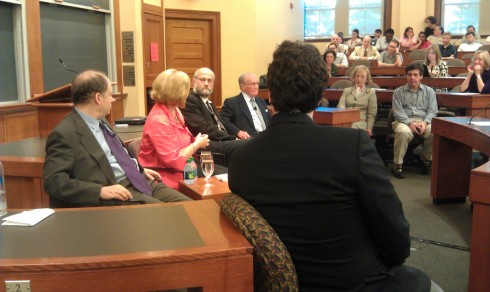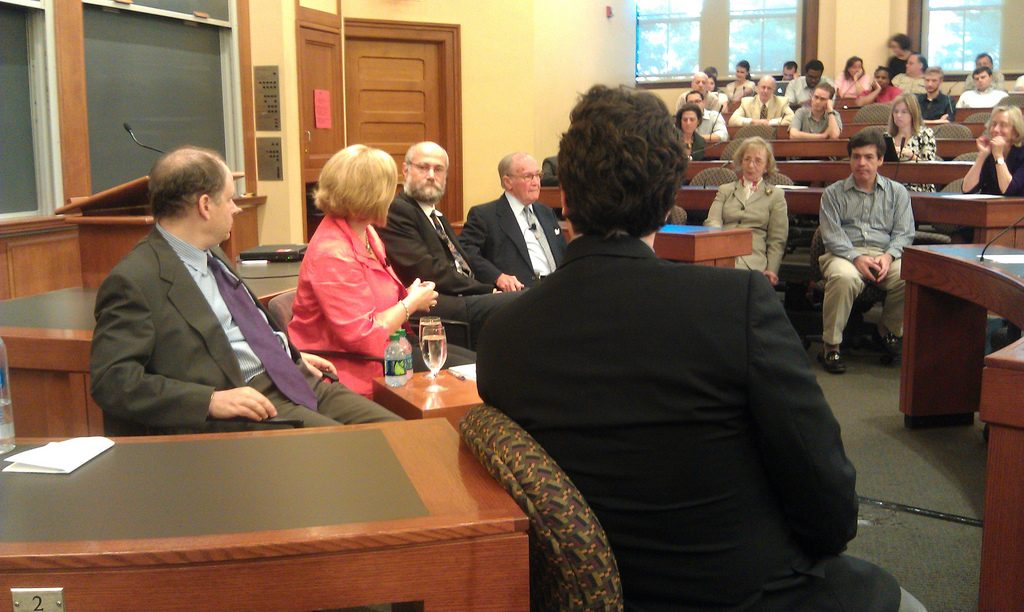Last week the Berkman Center hosted an event for the 50th anniversay of the “Vast Wasteland” speech, when Newton Minow (then chairman of the FCC) was publicly critical of the assembled National Association of Broadcasters for not doing more to serve the public interest:
We all know that people would more often prefer to be entertained than stimulated or informed. But your obligations are not satisfied if you look only to popularity as a test of what to broadcast. You are not only in show business; you are free to communicate ideas as well as relaxation. . . . It is not enough to cater to the nation’s whims; you must also serve the nation’s needs. And I would add this: that if some of you persist in a relentless search for the highest rating and the lowest common denominator, you may very well lose your audience. Because, to paraphrase a great American who was recently my law partner, the people are wise, wiser than some of the broadcasters — and politicians — think.
(Full text of the speech, including audio recording)
To commemorate the event, Berkman brought Minow, along with Ann Marie Lapinski, Jonathan Alter, and Yochai Benkler for a panel moderated by Jonathan Zittrain and John Palfrey, with responses from Susan Crawford, Perry Hewitt, Ellen Goodman, Virginia Heffernan, Reed Hundt, Kevin Martin, Nicholas Negroponte, Ethan Zuckerman, Doris Kearns Goodwin (a surprise), and comments by Terry Fisher. (More info on all those folks)

It was really a fantastic collection of smart people and the kind of event only the Berkman Center can pull off successfully. (Time for a redefinition of Cognitive Surplus? Interestingly, the ship on Gillgan’s Island, one of Clay Shirky’s examples of where the cognitive surplus used to go, was named the S.S. Minnow in reference to Minow and this speech!).
I only wish there’d been more time to explore the value that the diversity of media channels has brought since that speech – the value in the productive capability each of us now carries in our phones, laptops, and internet connections. There seemed to be a bit of nostalgia for the moment in which Minow really could “shake the lapels” of the assembled broadcasters and have his one voice carry so much weight. But is the loss of the bully pulpit such a bad thing when it is compensated for by multiple alternative avenues for the protection of the public interest, including some arguably commanded by “the public” themselves? I haven’t yet read Benkler’s newest book (The Penguin and the Leviathan: The Triumph of Cooperation over Self-Interest, though it is on my nightstand waiting) but it seems a missed opportunity that we didn’t hear more from him on the positive side of this shift away from 3 national broadcast media channels into a profileration of voices. Instead we got lots of pessimism about the Tower of Babel and broad references to the Arab Spring. I’d similarly love to have heard more from Ethan Zuckerman on global voices and the role of independent media. Maybe a few fewer celebrity respondents would have allowed the panel more time?
The most unexpected part of the evening was hearing Doris Kearns Goodwin learn that she too could edit wikipedia – I wonder if she’s made her first edit in the last week?
The video of the event is embedded below. Note that at roughly 4:33 yours truly interrupts the camera view just as Minow is being announced – coming in late. My 0.15 seconds of fame?)
Other coverage:
- Ethan Zuckerman liveblogged the event
- The ‘vast wasteland,’ reconsidered (Harvard Gazette)
- Harvard’s Berkman Center hosts star-studded forum on media and the “vast wasteland” (O’Reilly Radar)
- A Vast Wasteland, Five Decades Later (Josh Stearns on Storify)
- Harvard Law School coverage
- “A Vast Wasteland Revisited”: A Berkman Center discussion on the state of television and media (Joshua Benton, Nieman Journalism Lab)
